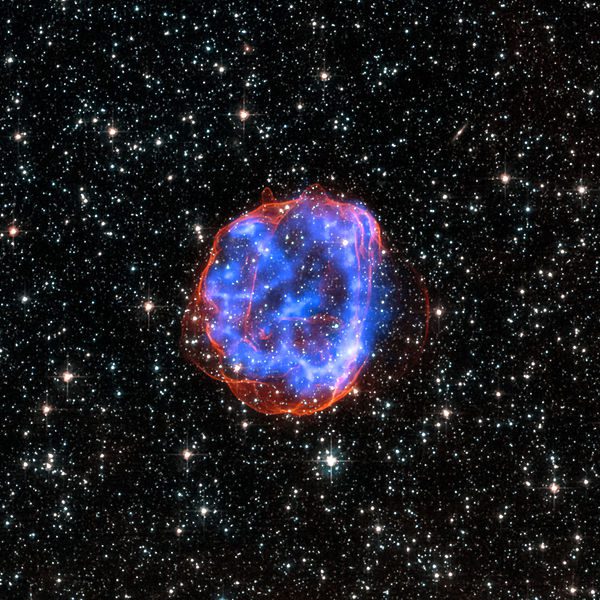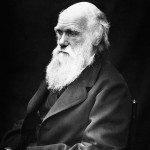+ Refutation of a Clueless and Dumbfounded Imaginary Atheist “Biblical Contradiction” for the 3,862nd Time

When a massive star exploded in the Large Magellanic Cloud, a satellite galaxy to the Milky Way, it left behind an expanding shell of debris (supernova remnant). NASA Hubble Telescope photograph (released on 1-22-15) [public domain / Wikimedia Commons]
*****
Awadhesh Kumar Singh appears to be an atheist. He showed up underneath my paper, “Catholicism and Evolution / Charles Darwin’s Religious Beliefs” in order to run down the Bible and Christianity. He came to the wrong place to do that! I think the “last laugh” was on him, if I do say so. His words will be in blue.
***
Since the universe itself has now been found to be dynamic, expanding at an increasing speed and the number of its content ever-changing, the belief in the creation of a fixed universe in a fixed time by God is meaningless.
Besides, the order of creation given by the Bible is as follows:
1st day – heavens, Earth and light [Genesis 1.1-5]
2nd day – sky [Genesis 1.6-8]
3rd day – separation of sea and land on Earth; fruit bearing plants on land [Genesis 1. 9-13]
4th day – Sun, Moon and stars [Genesis 1. 14-19]
5th day – all water animals and birds [Genesis 1. 20-23]
6th day – all other animals on land; humans (in God’s image) [Genesis 1. 24-31]
7th day – day of rest [Genesis 2.1-2]
This sequence and description of creation has several problems:
a) It has been scientifically proved that Earth, along with other planets of our solar system, was formed out of the initial stages of Sun (protoplanetary system). So, Earth came into existence later than Sun in the order of creation. But Bible says that Earth was created on very 1st day, while Sun was created on the 4th day! So, no matter how the “day” is interpreted, factually or metaphorically, of duration of 24 hours or 1 billion years, the order of creation described here is false.
b) Day and night on Earth make sense only with reference to Sun. But Sun was created on the 4th day. So, all references to morning, evening, day and night before creation of Sun are meaningless.
c) Moon formed due to collision of a planet-like body with Earth. So, it came into existence soon after Earth. So, it is false to say that Moon was created along with Sun on the 4th day, while Earth had been created on the 1st day.
d) Land plants are claimed to be created on the 3rd day, while Sun is said to be created on the 4th day. But vegetation cannot survive without sunlight. So, land plants created on the 3rd day could not have survived in the absence of sunlight.
e) It has been scientifically proved that land plants with seeds and fruits evolved only 130 million years ago, birds evolved 150 million years ago and water animals evolved first — billions of years ago. So, scientifically, water animals came first. Then, much later, birds evolved and after that, flowery and fruity plants evolved. But Bible says that fruity plants were created on the 3rd day, while water animals and birds were created on the 5th day! So, again no matter how one interprets the meaning of “day”, the sequence of creation described here is completely false.
f) Genesis 1.6 says that sky (or heaven) was made like a dome in such a way that there will be water above and below it. But no water has been found “above the sky”. Rain comes from clouds, which in turn are formed by evaporation of surface water of Earth. Clouds are within the atmosphere of Earth. So, rains do not come from “above the dome of sky”. Besides, sky cannot be considered like a dome, because dome can be only above the Earth, while sky is all around the Earth. There is nothing like ‘up’ and ‘down’ in this universe.
g) After the Big Bang which happened 13.8 billion years ago, everything – galaxies, stars, planets and life have evolved from one another as cause and effect. So, the belief in creation of Earth, stars, Sun, Moon, plants, animals, humans etc. in 6 days separately and directly without any internal causal connection between them is false.
h) Bible gives two contradictory accounts of creation of humans. In Genesis 1.27, God directly created a man and a woman:
So God created mankind in his own image,
in the image of God he created them;
male and female he created them.
But Genesis 2.7 says that God created only a man and that too from dust:
Then the LORD God formed a man from the dust of the ground and breathed into his nostrils the breath of life, and the man became a living being.
Later, God realized that man was alone; so He created a woman from one of his ribs (Genesis 2.22):
Then the LORD God made a woman from the rib he had taken out of the man, and he brought her to the man.
This contradictory account proves beyond any doubt that it was not God who created humans, but two separate men, unknown to each other, were writing Bible and developing their own doctrines about God. These two contradictory versions were combined by a third Bible writer or editor, who did not even care to make the story consistent.
So, the entire sequence of creation described in Bible is completely false.
[Courtesy of How All Religions are False and Harmful]
[Dave: a self-published book by an anonymous person; how impressive]
First of all, you take the Genesis accounts as both:
1) absolutely literal in all respects, and
2) chronological.
Neither is necessarily the case at all. Almost all serious Bible commentators (Protestant or Catholic) have held that the nature of the Genesis literature has strong poetic elements, while at bottom preserving actual historical events, too.
For example, most commentators have not thought that the tree of the knowledge of good and evil, and its fruit, were to be taken literally. They pictorially represent an idea. The rebellion of the human race was quite real and literal, but the images with which it was portrayed are not.
As for chronology, a book such as Hebrew for Theologians: A Textbook for the Study of Biblical Hebrew in Relation to Hebrew Thinking (Jacques Doukhan, University Press of America, 1993) notes that in the Hebrew mind, “the content of time prevails over chronology. Events which are distant in time can, if their content is similar, be regarded as simultaneous.” (p. 206)
Likewise, Thorleif Boman, in his book, Hebrew Thought Compared with Greek (New York: W. W. Norton & Company, 1960), devotes 61 pages to the topic of “Time and Space.” He noted that for the Hebrews, “time is determined by its content, and since light is authoritative and decisive, the light was called day and the darkness night even before the creation of the heavenly luminaries (Gen. 1.5).” (p. 131)
He notes also:
[W]e, too, characterize time by its content. We speak of wartime, peacetime, hard times, time of mourning, feast time, favourable time, office hours, bad year, etc. . . .
Thus, in part, the chronological times were named and characterized in accordance with their content in the Old Testament; day is the time of light and night is darkness (Gen. 1.5; Ps. 104.20). (p. 140)
Boman analyzes also how the Greeks and Hebrews variously pondered the planets and stars:
The Greeks, therefore, first consider the form of the heavenly bodies; they observe where they are in the heavens and in that way they (and the other Indo-Europeans) determine time. . . . The Hebrews call the heavenly bodies lamps, me’oroth (Gen. 1.14 ff.), or lights, ‘orim (Ps. 136.7); both names refer to their function. Lamps and lights help us to see; they illuminate and warm. (p. 131)
Ironically, Boman notes that Plato, in his Timaeus, gives an account of creation that is also non-chronological, just as in Genesis 1 and 2, and even provides two different accounts, with different emphases, as in Genesis also:
[T]he chronology and the sequence of the act of creation play no role in the Timaeus. Thus he sees himself compelled to report the creation of the celestial bodies before the world-soul, although he knows that this sequence is quite incorrect, and later he begins anew to describe the origin of the world in order to be able to express new ideas and qualities. (p. 175)
Thus, between the poetic + historical nature of these chapters, and the very different Hebrew conception of chronology and time, any seeming contradictions are amply explained as not necessarily so at all.
But like most severe atheist Bible critics, you don’t know what you’re talking about (and only think that you do, and falsely assume that we Christians are a bunch of ignoramus troglodytes).
Secondly, I just happened to recently write a review of a book dealing with silly alleged Bible contradictions. The author, Phillip Campbell, commented on the alleged “contradiction” of Genesis 1 and 2 (a great favorite of atheists; as evidenced above):
[T]he events in chapter 2 are not meant to happen after the events in chapter 1. Rather, chapter 1 presents a broad picture, followed by a kind of “zoomed in” perspective in chapter 2, which re-presents certain events from chapter 1 but in greater detail. This method is common throughout Genesis; for example, Genesis 11 tells of the various families descended from Shem and then Genesis 12 goes on to “zoom in” on a specific family – that of Abram.
Your falling prey to the faux-contradictions that are typical of extreme biblical skepticism is particularly absurd and ridiculous in this claim:
Bible gives two contradictory accounts of creation of humans. In Genesis 1.27, God directly created a man and a woman: . . . But Genesis 2.7 says that God created only a man and that too from dust: . . . Later, God realized that man was alone; so He created a woman from one of his ribs (Genesis 2.22):
There is no necessary logical contradiction here, but the fact that you are so “sure” that there is one is hugely entertaining (from the standpoint of enjoyment of the humor of skeptical folly, anyway).
Genesis 1:27 tells us that God created men and women.
Genesis 2:7 says that “God formed man of dust from the ground”.
Genesis 2:21-23 says that Eve was created from one of Adam’s ribs.
How in the world is this contradictory? The point is that God did this. He created. Genesis 1:27 makes the general statement, without delving into particulars (the “how” or process involved). Genesis 2 provides some of those, but in a way that is completely consistent, logically, with Genesis 1:27. Adam being created from the dust of the ground (2:7) is logically consistent with his having been created by God (1:27). Eve being made from a rib (2:21-23) is also completely consistent with her having been created by God (1:27), and from dust, for that matter, because Adam was from dust, and he is where she came from. It was something other than a purely natural process, by virtue of God being involved.
We also don’t necessarily know, by the way, how long any of this took, or what processes were involved (since “day” in Genesis need not be literally a 24-hour day). The “dust” here could have entailed primitive hominids, that evolved into human beings (anatomically), and were then given a supernatural soul by God, to become a human being. The text doesn’t address any of that. But such a scenario is perfectly possible within the broad outlines of the text.
Your fundamental logical difficulty arises from your false statement: “Genesis 2.7 says that God created only a man.” [my emphasis] The text there tells us that He created a man, but not “only” a man. In other words, it doesn’t exclude the fact that He could or may have created a woman, too. Its simply not a contradiction, and if you think it is, you need to go take Logic 0101 with the 18-year-old freshmen at a community college. And yes, I did take logic in college and understand full well how it works. If you still don’t get it, consider this analogy:
1) Dave the potter created two pots.
2) Dave formed Pot A from a big lump of clay.
3) Dave formed Pot B by taking some of the clay from Pot A and forming a second pot.
It’s clear that 1) all of these statements are logically consistent with each other, and 2) that Dave created both Pot A and Pot B. #2 does not contradict either #1 or #3. #3 does not contradict either #1 or #2.
Despite all of these rather obvious and elementary logical considerations, you triumphantly and ignorantly proclaim: “This contradictory account proves beyond any doubt that it was not God who created humans . . .”
As Bob Hope used to sing, “thanks for the memories.” I shall certainly treasure this classic example of atheist exegetical folly, as a quintessential case. I’ve watched over and over as atheists made fools of themselves, trying to interpret this Bible that they hate so much. Hatred and derision and contempt have a tendency to mess up people’s capacity to objectively, logically analyze anything.
Thirdly, the fact that we have observed that the universe is “dynamic, expanding at an increasing speed” has no relevance whatever to the beginning of the process. No one has yet explained that, and the hypothesis of God at the beginning is far more rational and believable than the universe being eternal or self-producing.
It is the atheist position on the “creation” of the universe by purely material processes that is implausible and irrational; see my paper, Atheism: the Faith of “Atomism”.
***
If Bible is taken 100% literally, it is obviously full of scientific falsehoods and immoral teachings. I have pointed out just some of them. There are hundreds of more examples of this type. So, Bible in this sense is an expression of an unscientific, outdated and primitive world-view.
If Bible is taken 100% metaphorically, everyone is free to create a story out of the events described there according to his sweet will. In that case, it is reduced to an entertaining and subjective mythology, which is of no significance for the world, except as a series of entertaining stories for a few people.
If Bible is partly interpreted as historical/factual and partly as metaphorical, who decides when we apply which interpretation? Your cherry picking an event as metaphorical may be interpreted factually by someone else and vice versa. So, what is the criterion?
So, you have landed yourself in hopeless contradiction!
Right. Now why don’t you interact with the scholarly material I have provided, and with my several arguments? Simply saying, “the Bible has 10,000 contradictions and everyone knows it,” is no argument. It’s the ad populum fallacy.
We obviously decide how to interpret by an intelligent understanding of genre, how literature and language work, and the Hebrew mind (i.e., the intent of the writer), just as in any other literature. But you’re unwilling to grant that “courtesy” to the Bible, just because it’s the Bible.
I don’t think you are capable of having a serious discussion about the Bible. You’re too ignorant about it, and too hostile. Hence, this pseudo-“reply” of yours.
***
For many other refutations of this sort of polemical material, see the (final) “ALLEGED BIBLICAL CONTRADICTIONS AND DIFFICULTIES” section of my Bible & Tradition web page, “’THE BUTCHER AND THE HOG’: THE ATHEIST APPROACH TO THE BIBLE” section (3rd from the end) of my Atheism & Agnosticism page, and the “BIBLE, CHRISTIANITY, AND SCIENCE ISSUES” section (4th from the end) of my Philosophy & Science web page.
*****













